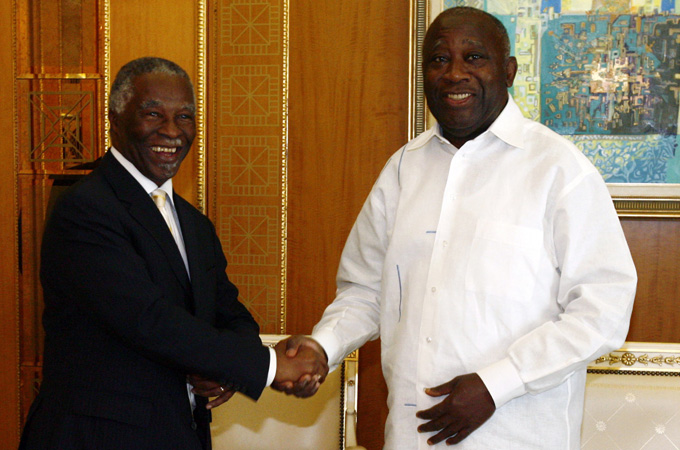Mbeki fails to end Ivorian crisis
African Union’s mediator fails to find solution to West African nation’s post election power struggle.

 |
| Despite mediation efforts by Mbeki, left, Cote d’Ivoire’s power struggle continues [Reuters] |
Thabo Mbeki, the former South African president, has ended his mediation mission to Cote d’Ivoire after failing to reach a settlement between Alassane Ouattara and Laurent Gbagbo, both of whom claimed victory in the country’s presidential election.
Mbeki had aimed in two days of talks to defuse the power struggle, but on Monday he said only that he planned to file a report to the African Union and made a plea for a peaceful solution.
“The African Union is very keen that peace can be sustained and every effort should be made to ensure this transition to democracy succeeds,” he said.
“Cote d’Ivoire needs peace and needs democracy … We indeed hope that the leadership of this country will do all that it can to ensure peace is maintained.”
The country’s November 28 election was meant to reunite the country after a 2002-03 civil war, but the poll ended in crisis when the Constitutional Council, run by a staunch ally of Gbagbo, scrapped hundreds of thousands of votes from Ouattara strongholds.
It reversed provisional results from the Election Commission that had given Ouattara a win and Gbagbo refused to concede. Both men took separate presidential oaths and set up rival administrations.
AP news agency reported on Monday that Ouattara’s spokesman said they were asking for the UN to use force and physically remove Gbagbo if he continues to cling to the office.
“President Barack Obama called to congratulate Ouattara. President Sarkozy congratulated Ouattara. Germany sent it by fax. So did England,” Joel N’Guessan said.
“These are countries that are on the Security Council. If they cannot make this man respect the results of an election certified by the UN, then we might as well stop talking about democracy in Africa.”
‘Deeply concerned’
At least 10 people have been killed in clashes between supporters of the rival factions over the last two weeks.
There were no reports of violence on Monday, but small groups of Ouattara-supporters burned tyres and blockaded roads in Abidjan as police in riot gear patrolled the streets.
Analysts warned the electoral dispute could trigger fresh unrest in the country and the United Nations has begun moving 500 non-essential staff out of Cote d’Ivoire because of the political uncertainty.
“Given the security situation in [Ivory Coast] and in accordance with standard UN procedures, non-essential staff members will be temporarily relocated to the Gambia,” Farhan Haq, a UN spokesman, said.
Ban Ki-moon, the UN secretary-general, is reportedly “deeply concerned” about the situation and the International Criminal Court’s prosecutor urged the Ivory Coast on Monday to act now to prevent possible war crimes or crimes against humanity.
“Ivory Coast today is announcing the possible commission of future crimes,” Luis Moreno Ocampo said, referring to Gbagbo’s decision to stay in power.
“So in terms of prevention, the time to act by the state is now,” he said.
While Gbagbo has the support of the nation’s top legal body and the military, Ouattara has international backing and can count on the support of the New Forces fighters in the country’s north.
“We’ve put our troops on alert,” Seydou Ouattara, a New Forces spokesman, was quoted by the Reuters news agency as saying.
“If we are attacked we will defend our zones and we will take the rest of the Ivorian territory,” he said, insisting that he hoped diplomacy would help avoid a “bloodbath”.
Donors concerned
The crisis has also spooked Cote d’Ivoire’s donors, with the World Bank and the African Development Bank saying that they would reassess aid to the country “given the breakdown in governance”.
In the latest political manoeuvring, Ouattara offered government positions to members of his rival’s cabinet if Gbagbo backs down.
Guillaume Soro, the country’s former prime minister who has pledged to serve Ouattara, told France’s Europe 1 radio: “If Laurent Gbagbo agrees to leave power quietly, the ministers from his party would be welcome in the government we plan to lead.”
Late on Sunday, Ouattara named Charles Koffi Dibby, Gbagbo’s former finance minister, as a member of his cabinet, a move which would strip Gbagbo of an official praised for his handling of debt talks.
Dibby was not available to confirm that he had switched sides.